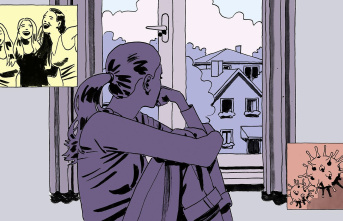In the midst of the debate in 2022 for the abolition of prostitution, spurred by the conceptual differences between PSPV-PSOE and Compromís within the Government of Ximo Puig, Valencia has emerged as a city against prostitution and «in which it is persecuted and punishes whoremongers ». A condition that contrasts with a curious antithesis, since 900 years ago the capital of the Turia was home to the largest brothel in all of Europe, which remained open for more than three centuries.
In recent weeks, the Vice President of the Generalitat, Mónica Oltra, and the Minister of Justice, Gabriela Bravo, have publicly exhibited their notable discrepancies when drawing up a plan to sanction brothels and persecute their clientele in the Valencian Community .
While the socialist head defends the reform of the Law on Public Shows to end prostitution in all kinds of places that function as brothels with sanctions against pimps, the leader of Compromís urges to accompany it "mandatorily" with a state framework of legislation that protects the migration of women against their exploiters. "It has to be addressed by analyzing the causes that cause this vulnerability and distinguishing very well what is sexual exploitation, trafficking and the people who dedicate themselves to it freely," she clarified.
On the other hand, the Valencia City Council, whose government team is made up of both political parties that disagree at the regional level, has approved a motion to draft a new ordinance that ends "the false debate" that prostitution "is sex work »: «It is sexual slavery that affects the human rights of the most vulnerable women and we must end the fiction of talking about a sexual contract because this supposed free consent hides an asymmetrical nature in which women are subject to domination,» he explained. the socialist deputy mayor Sandra Gómez.
A debate that the PSOE itself has transferred to the Congress of Deputies, where this Tuesday the processing of the Law to abolish prostitution has been approved, which includes the modification of article 187 of the Penal Code so that pimping is "generally punished without requiring exploitation relationship.
Contrary to the name of "abolitionist city" that the Municipal Council has proclaimed, Valencia was known in the Middle Ages for hosting one of the most popular brothels in all of Europe, in which, according to different historical sources, it came to have more than 200 prostitutes on its staff during its peak.
It was in 1321 when, after winning the capital of the Turia from Islam, King Jaime II changed the streets, inns and hostels for a gigantic brothel to concentrate prostitution in a space controlled by the public figure of a Regent. “No sinful woman dares to dance outside the place that she is already authorized to be in,” declared the monarch, according to the 19th-century historian Manuel Carboneres.
In this regard, in recent years initiatives have proliferated such as the one launched by Fernando López, from the Didamecum company, to design a tourist route of more than two hours that unraveled the erotic history of the Turia capital, including different stories linked to this well-known medieval brothel. Its precursor explained in his tour how the City Council of the time dictated the rules that prostitutes had to comply with and the "specialties" of each one of them represented in illustrations hung on each of its doors.
Other historical sources point out that the prostitutes did not come only from Valencia, but that they came from multiple parts of Spain, they even describe the existence of women of different religions, since relations between people with different beliefs were prohibited in the brothel. They also point out that any candidate who wanted to engage in prostitution had to be over twenty years old and request a license from the Department of Criminal Justice.
The popular Valencian lupanar opened practically every day, although there were certain exceptions. One of them was Holy Week, when the prostitutes, also known at the time as "public women", left said work aside and went to a religious center where they participated in talks and conferences aimed at leaving this job and « return to the straight path of the Lord."
The organization of the brothel provided its workers with a group of guards who watched to avoid all kinds of brawls caused by excess alcohol and other behaviors. Thefts of jewelry and clothing were common, although the existence of the only exit from the brothel made it easier to arrest the thieves.
This is how it worked until the mid-seventeenth century, when the archbishop and viceroy of the city, Fray Pedro de Urbina, ordered the women to abandon this work and go on to "serve" or "stay at home", or else they would be expelled from Valencia. in just ten days.












